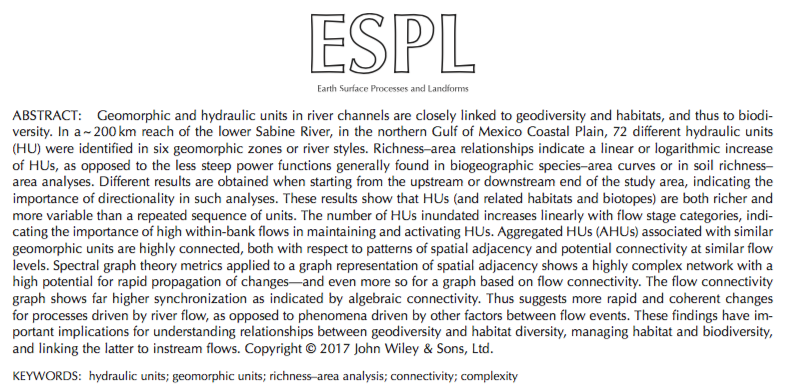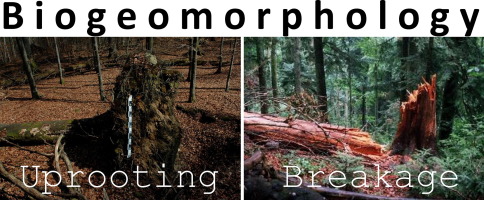HYDRAULIC UNIT RICHNESS & COMPLEXITY
Just published:
The abstract is below, and a preprint version is available here. 
Posted 6 December 2017
Just published:
The abstract is below, and a preprint version is available here. 
Posted 6 December 2017
The development and change over time (evolution) of geomorphic, soil, hydrological, and ecosystems (Earth surface systems; ESS) is often, perhaps mostly, characterized by multiple potential developmental trajectories. That is, rather than an inevitable monotonic progression toward a single stable state or climax or mature form, often there exist multiple stable states or potentially unstable outcomes, and multiple possible developmental pathways. Until late in the 20th century, basic tenets of geosciences, ecology, and pedology emphasized single-path, single-outcome conceptual models such as classical vegetation succession; development of mature, climax, or zonal soils; or attainment of steady-state or some other form of stable equilibrium. As evidence accumulated of ESS evolution with, e.g., nonequilibrium dynamics, alternative stable states, divergent evolution, and path dependency, the "headline" was the existence of > 2 potential pathways, contesting and contrasting with the single-path frameworks. Now it is appropriate to address the question of why the number of actually observed pathways is relatively small.The purpose of this post is to explore why some developmental sequences are rare vs. common; why some are non-recurring (path extinction), and some are reinforced.
In a 2009 article I introduced the concept of a geomorphological niche, defined as the resources available to drive or support a particular geomorphic process (the concept has not caught on). The niche is defined in terms of a landscape evolution space (LES), given by
![]()
where H is height above a base level, rho is the density of the geological parent material, g is the gravity constant, and A is surface area. The k’s are factors representing the inputs of solar energy and precipitation, and Pg represents the geomorphically significant proportion of biological productivity (see this for the background and justification).
Boyd Shearer and Whitney Walker are graduates of the UK Geography program. They will be presenting on their work, and the opportunities for geographers and geographic education at UK and in Lexington.
By Amaya DeVicente
Last year, 18 percent of the University of Kentucky graduating class graduated with global experience. The university’s International Center has taken steps to increase that percentage.
The UK International Center’s Education Abroad and Exchanges program (UK EA) recently announced a new 2018-19 scholarship and program fee reduction initiative for selected UK exchange partners around the world, ranging from $1,000-$5,000.
Just published in Geomorphology:
Samonil, P., Danek, P., Adam, D., Phillips, J.D. 2017. Breakage or uprooting: how tree death affects hillslope processes in old-growth temperate forests. Geomorphology 299: 276-284.
The abstract is below:


Posted 14 November 2017
Many organisms live in populations structured by space and by class, exhibit plastic responses to their social partners, and are subject to nonadditive ecological and fitness effects. Social evolution theory has long recognized that all of these factors can lead to different selection pressures but has only recently attempted to synthesize how these factors interact. Using models for both discrete and continuous phenotypes, we show that analyzing these factors in a consistent framework reveals that they interact with one another in ways previously overlooked. Specifically, behavioral responses (reciprocity), genetic relatedness, and synergy interact in nontrivial ways that cannot be easily captured by simple summary indices of assortment. We demonstrate the importance of these interactions by showing how they have been neglected in previous synthetic models of social behavior both within and between species. These interactions also affect the level of behavioral responses that can evolve in the long run; proximate biological mechanisms are evolutionarily stable when they generate enough responsiveness relative to the level of responsiveness that exactly balances the ecological costs and benefits. Given the richness of social behavior across taxa, these interactions should be a boon for empirical research as they are likely crucial for describing the complex relationship linking ecology, demography, and social behavior.
By Tatyanna Pruitt
Laura Greenfield, a UK College of Arts & Science geography alumna, was recently awarded the Sargent Shiver Youth Warriors Against Poverty Leadership Award by the Marguerite Casey Foundation. The award is presented to recognize and honor the vision, passion, and dedication of young people on improving the lives of families and communities.